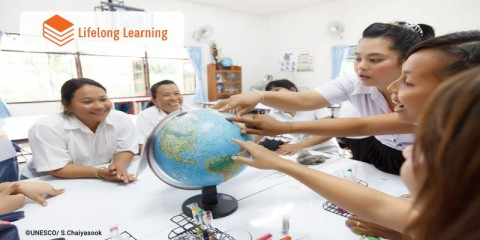
GCED Basic Search Form
Quick Search
You are here
News

Lifelong learning (LLL) is a process that integrated one’s life and learning altogether. LLL applies to people of all ages in all contexts, including formal and/or non-formal schools, workplaces, homes, and communities to continue learning and improving his or her knowledge, skills, and competencies. This process allows individuals who come from lower socioeconomic status to receive a second chance of schooling in order to pursue his or her career.
The Non-Formal Education and Literacy Team of UNESCO Bangkok Regional Office organized a two-day workshop to launch its new online course on Community Learning Centers and Lifelong Learning in Asia-Pacific from July 11 to 12, 2019, in Bangkok, Thailand. The event inspired participants to live up to the global commitment in SDG 4, which is ensuring “inclusive and equitable” and “lifelong learning opportunities for all.” Over 50 Ministry of Education officials and non-governmental organizations (NGOs)’ representatives from 14 Asia-Pacific countries participated in the event. The online course introduced participants to the benefits of LLL programmes, encouraging individuals’ legislative body to create platforms and enhance partnerships to continue promoting LLL in their communities.
Photo credit: Pornpilin Smithveja
Mr. Shigeru Aoyagi, the Director of UNESCO Bangkok, expressed the growing concern of adults’ illiteracy and the lack of governments’ efforts to address such dire issues: “More than 758 million adults are still illiterate globally, with 63% of these adults living in Asia. Less priority is given to adult learning and non-formal education sector, with nearly half of countries worldwide still spend less than 1% of their public education budget on adult learning.” Due to the rapid changes of technological advance and artificial intelligence, these adults often have limited access to education, which has little relevance to their lives. Consequently, this challenge makes it difficult for them to gain necessary knowledge and skill sets to compete in the job market. He called for a unified regional effort to ensure the education these adults received will address the challenges and shifts around the world.
In 2018, UNESCO Bangkok, a regional knowledge hub, cooperated with the Government of Japan to identify 11 essential topics on adult education and LLL. These topics were developed into 11 modules, which contain 30 short videos. These modules cover the basic concept of LLL, how to create effective leadership and governance, financing of adult education, issues and solutions for learners with different needs, and equivalency programmes/national qualifications framework, among other significant topics. The modules offer good practices and case-studies across the Asia-Pacific region for reference of promoting and creating LLL programmes.
The workshop offered eight of the 11 learning modules. Each session was an hour long, allowing participants to actively engage in learning and exchanging experiences with one another. Through these sessions, participants had opportunities to share their non-formal education, adult education and LLL policies and systems, community learning centers’ structures, monitoring and evaluation process, and their unique challenges. These conversations support each other’s efforts toward strengthening existing or creating a new holistic platform for LLL. Participants also discussed ways to collaborate with all stakeholders, including learners, governments, NGOs and the private sector, toward promoting and stimulating LLL from the bottom.
This two-day workshop was part of a larger dialogue and commitment of governments toward achieving SDG 4 by 2030. Nevertheless, everyone can be a part of this change. The online course is publicly available and accessible to anyone, and those who completed the course will receive a certificate of completion and appreciation by the UNESCO Office. These videos have been translated into different languages with support from partners in Lao PDR, Myanmar, Thailand, and Viet Nam.
URL:
